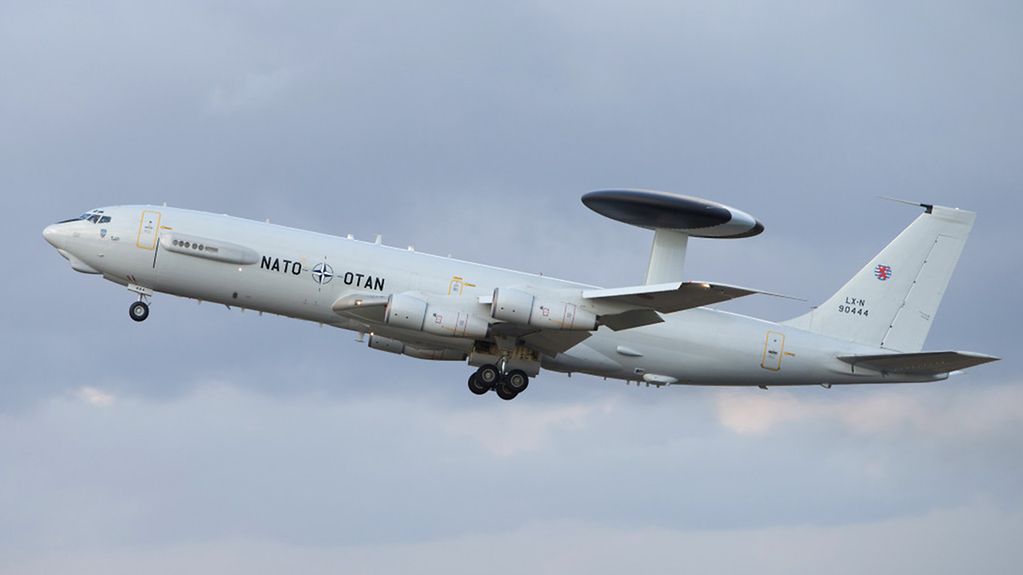Bundeswehr foreign mission
The Bundeswehr is to extend its mission to counter the IS terrorist organisation. In future German soldiers are also to monitor Syrian airspace from NATO AWACS (Airborne Early Warning and Control System) reconnaissance planes. The Cabinet decision must still be approved by the German Bundestag.
3 min reading time

In future Bundeswehr soldiers are to monitor Syrian airspace with the help of AWACS reconnaissance aircraft
Photo: Bundeswehr/Tom Twardy
German troops will continue to play an active part in the fight against the so-called Islamic State (IS). The Bundeswehr mandate is to be extended: Bundeswehr soldiers are to serve as part of the international crews of NATO’s AWACS (Airborne Early Warning and Control System) planes over Syria. The real-time data will provide a better overview of the actual situation on the ground.
Since December 2015 Germany has been supporting the international anti-IS coalition. As well as reconnaissance Tornado aircraft, mid-air refuelling aircraft are in action. And the frigate "Augsburg" is escorting a French aircraft carrier. More German troops are assigned to staff units and headquarters. This support will be continued.
The ceiling on the German troop contingent will remain unchanged at 1,200 soldiers. The mandate will run until 31 December 2017.
Mandate to be extended
The continuing and extended involvement in the fight against the IS is a key part of Germany’s security engagement in the region, and is designed to counter the direct and indirect threat to Germany, its allies and the international community.
The mission is designed as resolute action targeting strategic IS supply routes and resources, as well as the leaders, fighters and supporters of the terrorists.
At the NATO summit in Warsaw in July 2016, the heads of state and government decided to use NATO AWACS reconnaissance aircraft as part of the mission.
IS terrorism is a threat to Europe
IS terrorists continue to pose a major threat, especially in Iraq and Syria, but terrorist attacks in France, Belgium, Turkey and in Germany have also demonstrated that the IS is a threat to Europe.
The United Nations sees the IS as posing a "threat to world peace and international security". Terrorist actions and the continuing serious, systematic and extensive attacks on civilians go well beyond the borders of Syria and northern Iraq.
This threat must continue to be addressed resolutely and as part of a well coordinated approach. International efforts in the fight against the IS have the support of a broad international coalition, founded in 2104 in response to the terrorists territorial expansion. Germany too is part of this coalition.
The international coalition embraces 64 states and the European Union, the Arab League and Interpol. It is pursuing a comprehensive strategy that focuses on supporting military operations, cutting off access to financing and funding, stopping the flow of foreign terrorist fighters, communication and stabilisation measures. Germany is involved in all five areas of the work of the international coalition and chairs the working group on stabilisation jointly with the United Arab Emirates.
Germany’s armed forces are acting within the framework of and in compliance with the regulations of a system of mutual collective security as laid out in Article 24 (2) of the German Basic Law or constitution.
Humanitarian aid and development cooperation
Syria, Iraq and the countries in the region that are taking in refugees remain the focus of the German government’s humanitarian aid and development cooperation. At the conference on Supporting Syria and the Region held in London in February 2016, the German government pledged 2.3 billion euros for the period 2016 to 2019. This was the single largest bilateral pledge for aid measures and structure-building support in Syria and region.
In order to create prospects of a better future inside the region, an employment initiative /cash for work scheme was launched at the Syria conference. The aim is to create 50,000 new jobs in the region.
Since the war began in Syria, the German government has provided support totalling 2.47 billion euros. Of this sum, 1.24 billion euros is accounted for by humanitarian aid and 1.1. billion by medium- and long-term transitional aid and development cooperation.
In Iraq, the German government has provided about 591 billion euros since 2014, of which about 203 billion euros was earmarked for humanitarian aid and 388 billion euros for development cooperation. This makes Germany one of the largest donor nations.